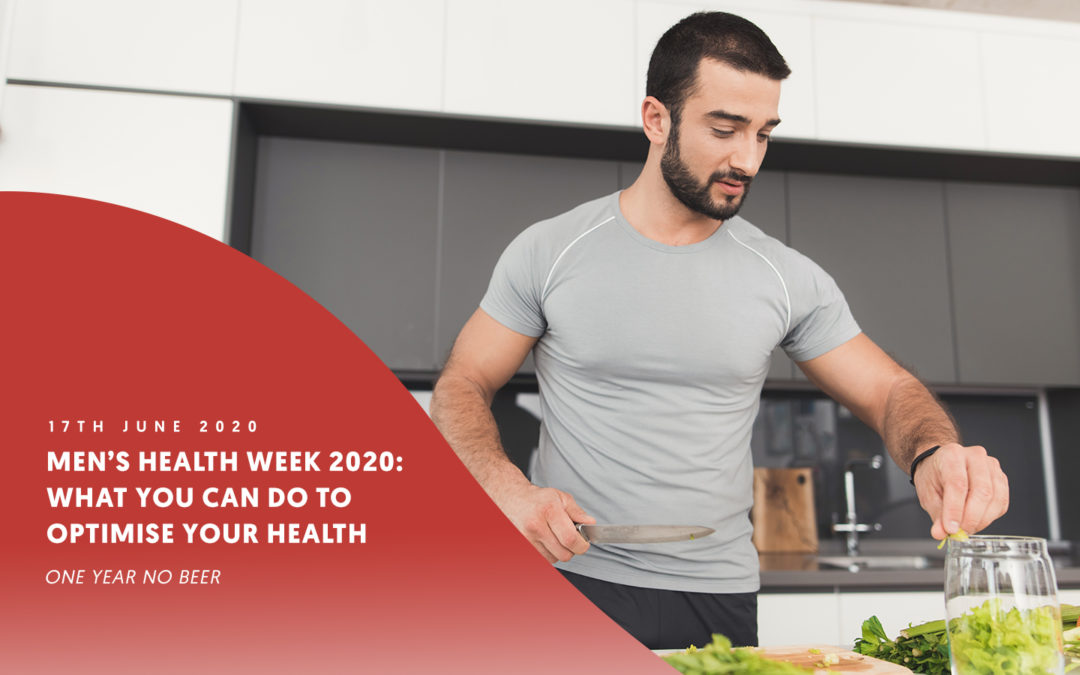Want to be the healthiest version of yourself? Here are some ways in which you can optimise your health and wellbeing to celebrate Men’s Health Week 2020.
Increased awareness in health and wellbeing topics has led to individuals being more proactive in their approach to a healthy lifestyle. Research has shown that shoppers are buying more healthy foods and are willing to spend a little more to get a healthier option, and pre-lockdown, the number of people with gym memberships was increasing.
However, data shows us that there is still a gender gap between men and women when it comes to health. Whilst overall lifespan is extending, men don’t tend to live as long as women and they are burdened with more health related issues throughout their lifetime. This is due to a variety of factors, such as biological; hormones, anatomy or metabolism, social; stress or social norms, or behavioural; such as activity level, risky behaviours or diet. The reality is that there is room for improvement when it comes to preventing health related issues.
Of course, this is not to say that men can change their biology, but what it does mean is that small changes in the influenceable factors such as diet and exercise could make a difference in the standard of life and lifespan of those willing to try.
Ways to improve men’s health in 2020:
- Exercise regularly
- Eat a balanced diet
- Avoid smoking
- Reduce your alcohol intake
- Reduce stress levels
- Connect with others
While it is likely you will have heard this advice before now, it is important to stress the message that for any of these changes to make a significant impact on your health in the long term, they need to be long lasting habitual and lifestyle changes you can sustain.
With this in mind, it can be beneficial to break each of these into small parts and tackle them one at a time so as to not overwhelm yourself. Once you see and feel the benefits of making even just one healthier choice, you have almost tangible results that can serve as motivation to fuel your next lifestyle change and so on.
Exercise regularly


The trick to making this habit last is to find a sport or exercise that you really enjoy doing, and changing it up regularly so you don’t get bored. Setting yourself small, achievable goals every few weeks will help to keep up your momentum and give you the motivation you need to keep working at it. There are thousands of online resources showing you different workout routines or ideas for getting moving, so do some research, try some things out and find out what works for you.
Eat a balanced diet
Don’t worry – we are not going to tell you that you can only eat veggies for the rest of your life (unless you want to!). What is important when it comes to diet is variety and balance. You can still enjoy your favourite treat, just in moderation along with all the other nutritious foods your body requires.
One good rule of thumb is to limit foods made by man, and instead eat foods that can be found naturally. Another good tip when looking to achieve a balanced diet is to ‘eat the rainbow’, eating as many different colours of naturally occurring foods as possible as this is often an indication of the different nutritional benefits they provide.
Generally, men are advised to eat around 2500 calories per day to maintain their weight but this number may vary depending on your height, weight goals or activity levels. While calorie counting can be counter productive, it is a good idea to be aware of the nutritional information for the foods you eat on a regular basis to ensure they fit into the guidelines of a balanced diet. If they fall on the less healthy side, then limit the occasions when you consume these.
Avoid smoking
On average, men tend to smoke or use tobacco products more than women. Any use of tobacco can have a detrimental impact on a whole variety of health related concerns thus by reducing or removing use of tobacco you are likely to have a positive influence on your health overall. For example, within the first 9 months of quitting tobacco, your lung capacity is likely to have improved by 10% – this will make that 20-40 minutes of exercise we mentioned earlier a lot easier to manage!
Smoking is also often used as a coping mechanism for stress, however the body is actually put under more feelings of stress as it faces nicotine withdrawal. By removing this need for a cigarette, you will put your body under less physical and mental stress, further reducing your chances of health complications later on down the line.
Reducing alcohol intake
If you have read any of our other articles, or know much about what we do at OYNB, you are well aware of our advice when it comes to reprioritising alcohol in your lifestyle. We have found that reducing alcohol consumption can lead to improvements in every aspect of life, which includes a number of benefits for your health.
To avoid repeating ourselves too much, here are the main points you should know about how alcohol can impact your health:
- Alcohol contains lots of empty calories which can lead to weight gain – additionally alcohol blocks the absorption of important nutrients from the food you eat.
- Alcohol reduces the amount of REM sleep you get a night, which is the restorative kind of sleep you need to wake up feeling well rested and energised.
- Alcohol can exacerbate feelings of stress and anxiety over time.
- Alcohol puts unnecessary pressure on important organs such as your liver, and can lead to other serious health complications.
By reducing the amount of alcohol you consume, you can experience improvements in each of these areas of your health and by taking a sustained break from alcohol, you are more likely to continue afterwards with a reduced level of alcohol intake.
Reduce stress levels


Finding the right ways to manage stress is crucial to maintain a healthy body and mind, as stress can manifest itself in both physical and mental ways. Fortunately, there are a number of options here, for example; seeking support from loved ones, or alternatively a professional therapist or doctor, taking regular holidays or breaks from work, and staying active. Each of these can help to ease feelings of pressure, and allows you to be in control of the response to stressors.
There are a number of tools you can use to manage feelings of anxiety and stress as they come and go, including breathing exercises and meditation. These are skills that require some time to learn, so by getting used to using these techniques before you need them, you will be able to effectively deploy them in times of stress.
Connect with others
Social interactions have an underestimated influence on health and wellbeing, in fact it has been shown that social interactions have a strong correlation with health. However, research has revealed that 1 in 5 men do not have any close friends, with a third reporting they would not say they had a ‘best friend’.
Humans are fundamentally social creatures, and we thrive off social interactions with other people to boost our self confidence, sense of belonging and happiness. Many adults find it hard to develop new friendships or keep up existing friendships as other responsibilities get in the way, but it is important to try to continue forging or maintaining friendships.
This is where online communities can come in very handy. They offer a way to connect with others that you may not ordinarily come into contact with, and allow you to bond over similar interests or goals. Communicating online can also help to relieve some of the social pressures that men face in day-to-day life where they are expected to ‘stay strong’ or ‘act like a man’, instead allowing them to share their experiences and express themselves.
So what now?
No doubt you have heard these lessons before, it is nothing revolutionary. But what is going to make this attempt to get healthy different than before? Motivation!
It is time to make your health a priority, put yourself first and make small, incremental changes to improve your body and mind so you have the opportunity to thrive.



An entrepreneur and former senior oil broker, Ruari gave up drinking after excessive consumption almost cost him his marriage, and worse, his life. Going alcohol-free improved his relationships, career and energy levels, leading to him founding OYNB to provide a support network for others.







